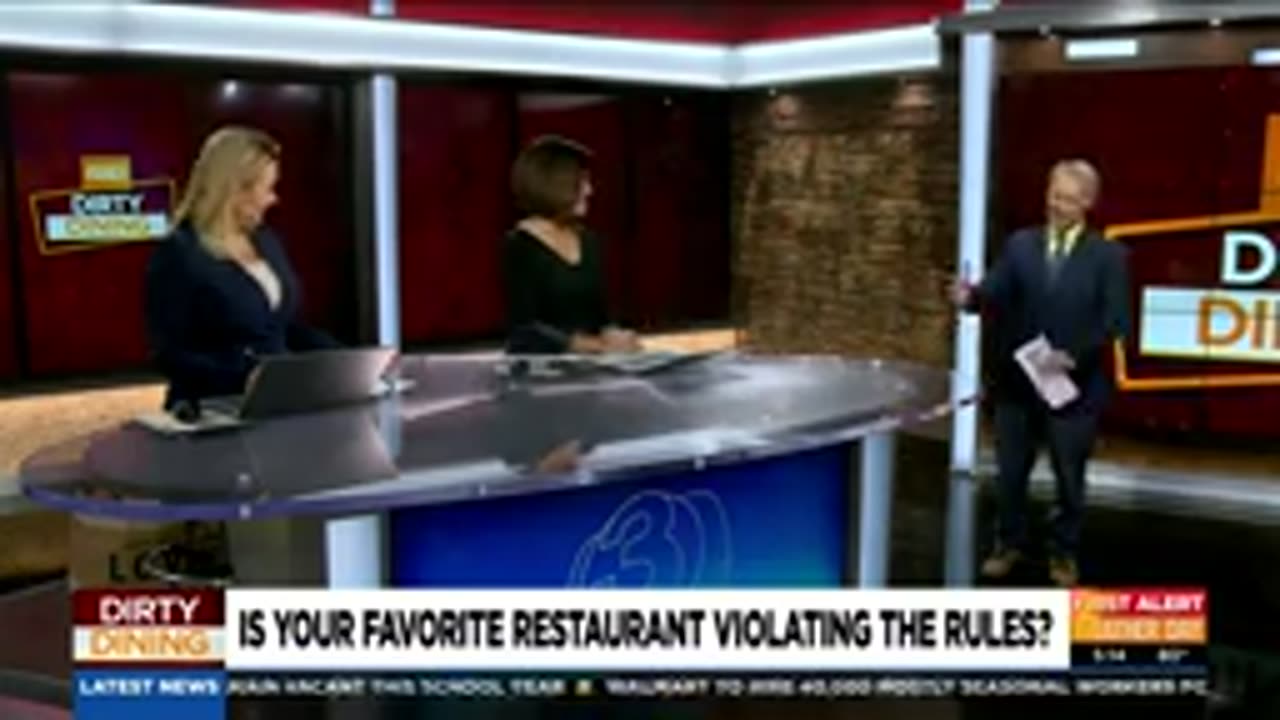Premium Only Content

How Maricopa County health inspectors find violations at restaurants
Maricopa County health inspectors play a crucial role in ensuring the safety and cleanliness of food establishments in the area. When inspecting restaurants, they follow a systematic process to identify potential food safety violations that could lead to foodborne illnesses or pose health risks to customers. Here's how they typically find violations:
### **1. Routine Inspections**
Health inspectors conduct both **scheduled** and **unscheduled inspections** of food establishments. These inspections typically happen:
- **Annually** for most restaurants, but they may also be more frequent depending on the type of establishment or previous violations.
- **Unannounced**, so restaurant owners cannot prepare in advance to correct issues.
During an inspection, inspectors evaluate various areas of the restaurant, focusing on food safety practices, cleanliness, and overall hygiene.
### **2. Checklist of Health and Safety Standards**
Inspectors use a checklist based on local health codes and food safety regulations to ensure restaurants meet the minimum required standards. Some of the critical areas they check include:
#### a. **Temperature Control**
- **Correct food storage temperatures**: Inspectors check the **fridge** (should be at 41°F or below) and **freezer** (should be at 0°F or below) to ensure perishable foods are stored safely.
- **Hot food temperatures**: Hot foods should be kept at **135°F or above**.
- **Temperature logs**: Many restaurants are required to keep temperature logs for refrigerators, freezers, and hot-holding units, which inspectors review.
#### b. **Food Handling and Cross-Contamination Prevention**
- **Hand washing**: Inspectors check that employees are washing their hands regularly and properly, especially after handling raw foods or using the restroom.
- **Separate equipment for raw and ready-to-eat foods**: Inspectors verify that raw meats, poultry, and seafood are stored separately from ready-to-eat foods to avoid cross-contamination. They also check that separate cutting boards and utensils are used for raw versus cooked food.
- **Proper handling of food**: Inspectors observe staff to ensure that food is being handled safely, such as wearing gloves or using utensils to prevent direct hand contact.
#### c. **Cleaning and Sanitation**
- **Cleanliness of surfaces**: Inspectors check for cleanliness in food prep areas, surfaces, and kitchen tools. They make sure equipment, counters, and storage areas are properly cleaned and sanitized.
- **Sanitizing procedures**: They confirm that proper sanitizing solutions are being used for cleaning equipment, and verify the correct use of **food-safe chemicals** and cleaning protocols.
- **Waste management**: Inspectors ensure that waste disposal and garbage areas are clean, and that trash is regularly removed from food prep areas.
#### d. **Employee Health and Hygiene**
- **Employee illness**: Inspectors check whether employees are following protocols for reporting illnesses, especially foodborne illness symptoms (e.g., vomiting, diarrhea, fever).
- **Personal hygiene**: They ensure that staff members are wearing clean uniforms, using gloves when required, and following appropriate hygiene practices.
#### e. **Pest Control**
- Inspectors look for signs of **pests** (rodents, insects, etc.) in food storage areas, kitchens, and dining areas. They also verify that pest control services are in place and that all openings to the outside are sealed properly to prevent pest entry.
### **3. Observational Inspection**
Beyond checking logs and documents, inspectors observe the daily operations and staff behavior to ensure food safety practices are followed. This includes:
- **Staff interactions with food**: Inspectors may ask staff members to demonstrate how they handle food to ensure they are following proper procedures.
- **Temperature monitoring during service**: Inspectors may check the temperature of hot and cold food during peak hours to ensure they are being kept at safe temperatures.
### **4. Common Violations Found by Inspectors**
Some of the most common violations that Maricopa County health inspectors find during restaurant inspections include:
- **Improper food storage**: Raw meat stored above ready-to-eat food, or food not kept at safe temperatures.
- **Cross-contamination**: Using the same cutting board for raw meat and vegetables without proper cleaning in between.
- **Improper hand washing**: Employees not washing their hands before handling food or after touching raw food.
- **Inadequate sanitizing**: Lack of proper sanitizing of surfaces, utensils, and equipment after each use.
- **Pest activity**: Visible signs of rodents or insects in food prep areas or storage rooms.
- **Expired food**: Serving food past its expiration date or using food that has been improperly stored.
### **5. Follow-Up and Enforcement**
If inspectors find violations, they typically issue a **report** with specific recommendations for correction. Depending on the severity of the violation, they may:
- **Give the restaurant a set period** to correct the issue (usually 5 to 10 days).
- **Re-inspect** the restaurant after a set time to ensure that corrections have been made.
- **Issue fines or penalties** for repeated or serious violations.
- In extreme cases, inspectors may issue a **temporary closure order** if the violations are considered a serious health risk.
### **6. Public Disclosure**
Maricopa County, like many local health departments, makes inspection results publicly available. **Inspection scores and reports** can be found on the Maricopa County Environmental Services website or by searching restaurant names in the system. This helps consumers make informed decisions when choosing where to eat.
### **Conclusion**
Maricopa County health inspectors follow a detailed process to ensure restaurants are meeting health and safety standards. Their inspections are designed to catch potential violations before they cause harm to the public. By conducting thorough checks on temperature control, food handling, cleaning, and employee hygiene, inspectors help prevent foodborne illnesses and maintain public health standards.
Would you like more information on how inspection scores impact a restaurant's business or on specific food safety practices?
-
 1:31:21
1:31:21
Tucker Carlson
5 hours agoBrigham Buhler: UnitedHealthcare CEO Assassination, & the Mass Monetization of Chronic Illness
178K216 -
 2:29:04
2:29:04
Nerdrotic
6 hours ago $11.35 earnedHappy New Years - Nerdrotic Nooner 454
76.6K13 -
 32:20
32:20
Rethinking the Dollar
5 hours agoThe U.S. Debt Crisis That Was "Made In America" w/ Paul Stone
55K10 -
 3:31
3:31
SLS - Street League Skateboarding
1 day agoCoco Yoshizawa’s 3rd Place Finish at SLS Tokyo 2024 | Best Tricks
59.1K5 -
 46:15
46:15
Grant Stinchfield
1 day ago $13.68 earnedNew: The COVID Cover-up Revealed! Team Biden Caught in a Big Lie!
53.8K18 -
 2:35:08
2:35:08
The Shannon Joy Show
20 hours ago🔥🔥LIVE Exclusive W/Daniel Horowitz - New Year 2025 Analysis On Culture, Economy & Politics🔥🔥
59.6K21 -
 33:14
33:14
Tudor Dixon
6 hours agoThe World Walk with Tom Turcich | The Tudor Dixon Podcast
40.3K2 -
 7:29:48
7:29:48
PudgeTV
12 hours ago🔴 Gaming on Rumble - Marvel Rivals | Iron Man's Armory: Equipping Groot and Jeff for Battle
43.5K3 -
 1:58:48
1:58:48
The Charlie Kirk Show
5 hours ago2024 In Review + The Truth About H-1Bs | Girdusky, Carl | 12.30.24
112K45 -
 6:51
6:51
The Rubin Report
6 hours agoDave Rubin Reacts to Trump’s Greatest Moments
50.8K11